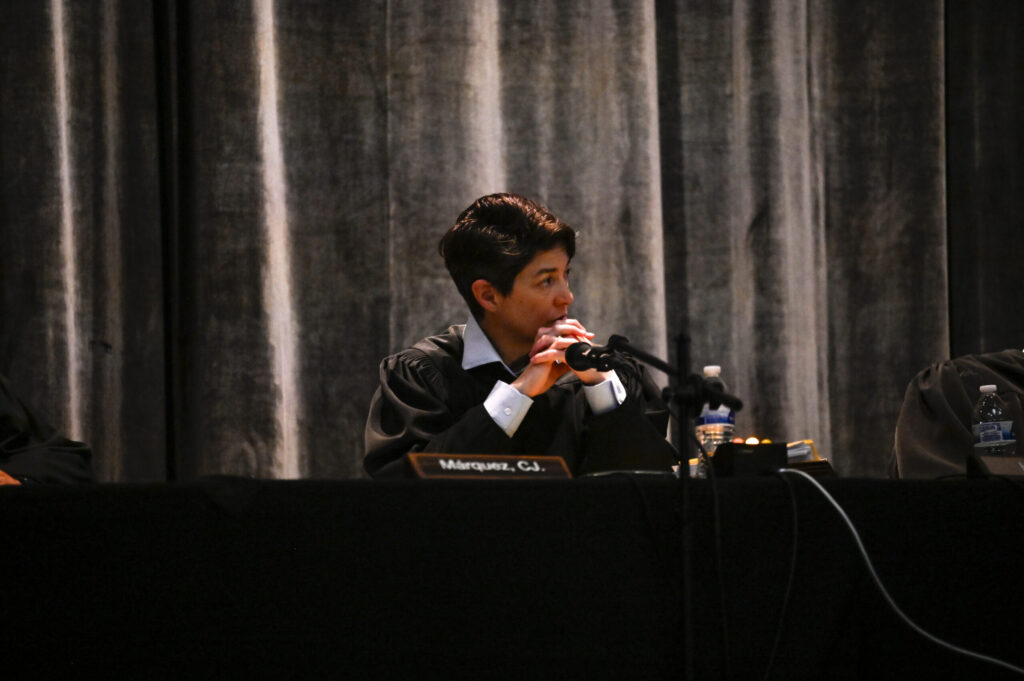Colorado judge’s financial conflict did not bias ruling, colleague finds

A federal judge in Colorado ruled how “any judge” would have in a case, even though he had an undisclosed financial stake in one of the corporate parties, a colleague of his determined this week.
U.S. District Court Senior Judge R. Brooke Jackson was one of the 131 federal judges across the country identified in a bombshell Wall Street Journal report who had presided over cases despite failing to disclose a financial investment of one of the parties to the lawsuit.
In the wake of the revelations last September, Jackson directed the clerk of Colorado’s federal trial court to notify the parties in at least 36 cases he handled despite needing to recuse himself.
“Judge Jackson informed me that it has been brought to his attention that while he presided over the case he or his spouse owned interests in Wells Fargo funds,” read the letter to a Weld County man who sued Wells Fargo and Blue Credit Union in 2019. “The funds ownership neither affected nor impacted his decisions in this case. However, this ownership would have required recusal under the Code of Conduct for United States Judges.”
Following the letter, a colleague of Jackson’s, U.S. District Court Senior Judge John L. Kane, reviewed Jackson’s August 2020 ruling to dismiss the lawsuit from Brandon Baker against Blue Credit Union. Wells Fargo, the other defendant, agreed to arbitration with Baker. Kane determined Jackson’s judgment was unaffected by his conflict of interest.
“I find that Judge Jackson made no discretionary rulings or subjective determinations that favored Defendants,” Kane wrote in a Jan. 18 order. “The Judge’s legal conclusions are unassailable.”
That was not the belief of Baker, who responded to the clerk’s letter with a long list of grievances, most of which did not pertain to Jackson.
“The judge in question, some how DISMISSED and REFUSED DEFAULT JUDGMENTS THAT WERE PROPER AND TIMELY!??” wrote Baker, who represented himself in the case. Baker, who identified as a “Rastafari/Native American minister/practitioner leader and financial officer of greenfaith Ministry,” alleged Blue Credit Union and Wells Fargo had discriminated against him based on his religion and also retaliated against him.
The case went first to U.S. Magistrate Judge Nina Y. Wang, who recommended dismissing the lawsuit. Baker’s claim was that the credit union had canceled his accounts due to his involvement with cannabis. Wang, in a 16-page order, believed Baker had not brought his claims pursuant to the correct federal law. She also pointed to Baker’s own admission that he “could not find any actual direct federal statutes” for his claims.
Neither Baker nor Blue Credit Union objected to the recommendation, and Jackson adopted it and dismissed the case.
In response to the clerk’s letter, the credit union believed Kane should uphold Jackson’s dismissal of the case because he had a financial interest in Wells Fargo, not Blue Credit Union. Wells Fargo argued that Jackson never made a major decision about the company in the lawsuit, given that Baker voluntarily agreed to arbitration.
Kane acknowledged that Jackson should have recused himself from the case before taking any action on it. Regardless, the only decision of his worth reviewing was the adoption of the magistrate judge’s recommendation to dismiss the lawsuit.
“I find the Recommendation comprehensive and well-reasoned, and I consider Judge Jackson’s adoption of the Recommendation to be proper,” Kane concluded. “I cannot conceive of any judge rejecting or modifying it.”
Kane’s decision may be the first of several, if parties seek review of Jackson’s involvement upon learning of his financial conflicts in their cases. Jackson acknowledged he had mistakenly failed to recuse himself in 36 cases where he or his wife owned stock in companies appearing before him. He explained in a letter to the Wall Street Journal that he remained in the dark about his investments, while his wife handled his financial disclosure forms.
“At least I can say without reservation that our investments never have, and never could have, affected my handling of any case in any way,” Jackson wrote.
Federal law requires judges to disqualify themselves based on their or their spouse’s financial interests. Judges also have a duty to stay informed of their investments.
In the 36 cases where Jackson pointed out his undisclosed conflicts of interest, many resolved themselves or transferred to another jurisdiction before Jackson could play a substantial role, a Colorado Politics review found. Although the Wall Street Journal presented Jackson with the list of 36 cases, Baker’s was not on that list.
“I am embarrassed that I did not properly understand and apply the stock ownership rule,” Jackson said in his letter. In addition to Wells Fargo, he or his wife held stock in Pfizer, Chevron, Apple and Home Depot, among other corporations.
The clerk of the U.S. District Court, Jeffrey P. Colwell, explained that when a judge recuses themselves from a case, it is reassigned to another judge at the court. Only on occasions where all members of the court decide they should not handle the case would a judge from outside the state oversee it.
Chief Justice John G. Roberts Jr. of the U.S. Supreme Court addressed the conflict-of-interest revelations in his year-end report last month. He wrote that the judicial branch strives for 100% compliance with the recusal policy to ensure the public’s confidence, and that new judges undergo ethics training.
“A small number apparently did not take sufficient note and are now learning the lesson,” Roberts added.
This story has been updated with additional details from the clerk of the U.S. District Court.














